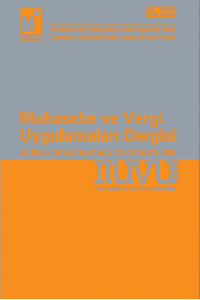INVESTIGATION OF THE EFFECT OF PROJECT – BASED LEARNING METHOD ON ACADEMIC SUCCESS FOR COMPUTERIZED ACCOUNTING APPLICATIONS COURSE IN HIGHER EDUCATION
Abstract
Learning performances of students were investigated
with comparing the traditional teaching model and project based learning model
for higher education students by using Computerized Accounting Practices and
Office Programs lessons in this study. In this context it is aimed to prove the
effectiveness and efficiency of the project based learning method on learning
outputs in the study.
The course of Office Programs has been taught by traditional teaching method
and the couse of Computer Accounting by project based learning approach to
students with using qualitative research methods in this study. Subsequently, questionnaires have been
distributed to compare the methods to the students who are participating in the
courses and exams. Outputs of traditional teaching
and project-based learning process areas were analyzed with frequency and
percentage values. As a result of the study, it has been determined that
project based learning is more effective and efficient than traditional
teaching.
References
- ICAFR 17
YÜKSEKÖĞRETİMDE BİLGİSAYARLI MUHASEBE UYGULAMALARI DERSİ İÇİN PROJE TABANLI ÖĞRENME YÖNTEMİ KULLANILMASININ AKADEMİK BAŞARIYA ETKİSİNİN İNCELENMESİ
Abstract
Bu çalışma ile yükseköğretim öğrencilerinin geleneksel
öğretim modeli ile proje tabanlı öğrenme modeli, Bilgisayarlı Muhasebe
Uygulamaları ve Ofis Programları dersleri kapsamında karşılaştırılarak,
öğrencilerin öğrenme performansları araştırılmıştır. Bu kapsamda çalışmada,
proje tabanlı öğrenme metodunun öğrenme çıktılarındaki etkisi ve etkinliğinin
ispat edilmesi amaçlanmıştır. Nitel araştırma yöntemleri kullanılarak yapılan bu
çalışmada, öğrencilere, Ofis Programları dersi geleneksel öğretim yöntemiyle,
Bilgisayarlı Muhasebe dersi ise proje tabanlı öğrenme yaklaşımı ile
işlenmiştir. Akabinde derslere ve sınavlara katılan öğrencilere yöntemler
arasında karşılaştırma yapmaları için anket formları dağıtılmıştır. Formlarda geleneksel öğretim ve proje tabanlı öğrenme
süreci alanlarından elde edilen bulgular çözümlenerek frekans ve yüzde
değerleri ile ifade edilmiştir. Çalışma sonucunda, proje tabanlı öğrenmenin,
geleneksel öğretime kıyasla daha etkin ve etkili olduğu tespit edilmiştir.
References
- ICAFR 17
Details
| Primary Language | Turkish |
|---|---|
| Journal Section | Issue |
| Authors | |
| Publication Date | April 20, 2018 |
| Submission Date | September 29, 2017 |
| Acceptance Date | April 1, 2018 |
| Published in Issue | Year 2018 Special Issue of the 10th Year |
Cited By
Action Research on Improving Students’ Conceptual Understanding in the “Force and Energy” Unit through Semantic Mapping
International Journal of Contemporary Educational Research
https://doi.org/10.52380/ijcer.2023.10.4.474
Bir Kültürel Direniş Örneği Olarak Kur’an’da Ashab-ı Kehf
Journal of Analytic Divinity
Merve Betül ÇİFTÇİ
https://doi.org/10.46595/jad.733865

This Journal Licensed under a Creative Commons Attribution-NonCommercial 4.0 International License.
This license allows reusers to distribute, remix, adapt, and build upon the material in any medium or format for noncommercial purposes only, and only so long as attribution is given to the creator.


